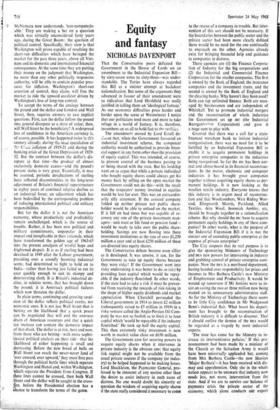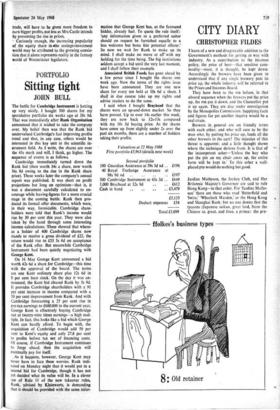Equity and fantasy
NICHOLAS DAVENPORT
That the Conservative peers defeated the Government in the House of Lords on an amendment to the Industrial Expansion Bill— by sixty-seven votes to sixty-three—was under- standable. The Tories have always regarded this Bill as a sinister attempt at backdoor nationalisation. But some of the arguments they advanced in favour of their amendment were so ridiculous that Lord Hirshfield was really justified in 'Calling them an 'ideological fantasy.' As our economic difficulties press harder and harder upon the scene at Westminster I notice that our politicians tend more and more to take refuge in a world of fantasy. It is, therefore, incumbent on us all to hold fast to the realities.
The amendment -itioved by Lord Erroll de- :.:area" that, when the Government favoured an industrial investment scheme, the competent authority would be authorised to provide finan- cial support in any form other than the provision of equity capital. This was intended, of course, to prevent control of the business passing to or being shared with the state. But his lordship went on to argue that while a private individual who bought equity shares could always get his money back by selling on the open market the Government could not do this—with the result that the taxpayers' money invested in equities would be lost for ever. This was an extraordin- arily silly statement. If the assisted company folded up neither private nor public share- holder would be able to unload on the market. If it fell on bad times but was capable of re- covery any one of the private investment man- agers—unit trust or life fund or pension fund— would be ready to take over the public share- holding. Savings are now flowing into these investment institutions at the rate of over £1,250 million a year and at least £250 million of these are directed into equity shares.
The Conservative debate became even sillier as it developed. It was unwise, it ran, for the- Government to take up equity shares because they were risky! If the Government went into risky undertaking it was better to do so (sic) by providing loan capital which would be repay- able if the industry flourished. In other words, if the state had to take a risk it must be preven- ted from receiving the rewards of risk-taking in the shape of higher equity dividends and market appreciation. When Churchill persuaded the Liberal government in 1914 to invest £2 million (subsequently raised to £5 million in 1919) in a risky venture called the Anglo-Persian Oil Com- pany he was not so foolish as to limit it to loan capital which 'would be repayable if the industry flourished.' He took up half the equity capital. This then extremely risky investment is now worth in market value close on £650 million.
The Government case for securing powers to acquire equity shares when it intervenes in private industry is the obvious one; that equity risk capital might not be available from the usual private sources if the company (or indus- try) to be helped happened to be making losses. Lord Shackleton, the Paymaster General, pro- fessed to be innocent of any motive other than the desire to assist industry in such cases of distress. No one would doubt his sincerity or question the wisdom of acquiring equity shares if the state really considered it necessary to come to the rescue of a company in trouble. But inter- vention of this sort should not be necessary. If the boundaries between the public sector and the private sector had been more clearly defined there would be no need for the-one continually to encroach on the other. Agencies already exist for bringing financial help and guidance to companies in distress.
These agencies are (1) the Finance Corpora- tion of Industry for the big corporations and (2) the Industrial and Commercial Finance Corporation for the smaller companies. The first is owned by the Bank of England, the insurance companies and the investment trusts, and the second is owned by the Bank of England and the clearing banks. Why haven't they been used? Both can tap unlimited finance. Both are man- aged by businessmen and are independent of Whitehall. Yet to promote industrial mergers and the reconstruction of whole industries the Government set up IRC (the Industrial ReorganiqQfion. Corporation) and gave it a huge sum to play with.
Granted that there was a call for a state- financed merchant bank to initiate industrial reorganisation, there was no need for it to be fortified by an Industrial Expansion Bill to enable it to acquire permanent holdings in private enterprise companies in the industries being reorganised. So far the IRC has been cor- rect and above-board in its financial reconstruc- tions. In the motor, electronic and computer industries it has brought great companies together without acquiring equity shares as per- manent holdings. It is now looking at the woollen textile industry. Everyone knows that this industry is in urgent need of reconstruc- tion and that Woolcombers, West Riding Wor- sted, Illingworth Morris, Parkland, Allied Textiles, Aire Wool, Jeremiah Ambler, etc, should be brought together in a rationalisation scheme. But why should the IRC have to acquire permanent equity holdings in any of these com- panies? In other words, what is the purpose of the Industrial Expansion Bill if it is not the sinister one of extending public enterprise at the expense of private enterprise?
The City suspects that its real purpose is to give the sponsoring Ministers of Technology and DEA new powers for intervening in industry and grabbing control of private enterprise com- panies. Now the DEA is a moribund department, having handed over responsibility for prices and incomes to Mrs Barbara Castle's new Ministry of Employment and Productivity. It would be wound up tomorrow if Mr Jenkins were to in- sist on saving the two or three million now being wasted on its unnecessary administrative staff. As for the Ministry of Technology there seems to be little City confidence in Mr Wedgwood Benn's industrial flair. What boost his depart- ment has brought to the reconstruction of British industry it is difficult to discover. That it should outlive the demise of the DEA would be regarded as a tragedy by most industrial experts.
`The time has come for the Ministry to in- crease its interventionist policies.' If this pro- nouncement had been made by a minister of the Church or the Salvation Army it would have been universally applauded but, coming from Mrs Barbara Castle—the new Shavian `Major Barbara'—it has been received with dis- may and apprehension. Only she in the whole nation appears to be unaware that industry now needs less, not more, intervention from the state. And if we are to survive our balance of payments crisis the private sector of the economy, which alone conducts (Mr export
trade, will have to be given more freedom to earn bigger profits, not less as Mrs Castle intends by preventing the rise in prices.
Curiously enough, the increasing popularity of the equity share in lithe savings-investment world may be attributed to the growing convic- tion that it alone represents reality in the fantasy world of Westminster legislators.







































 Previous page
Previous page